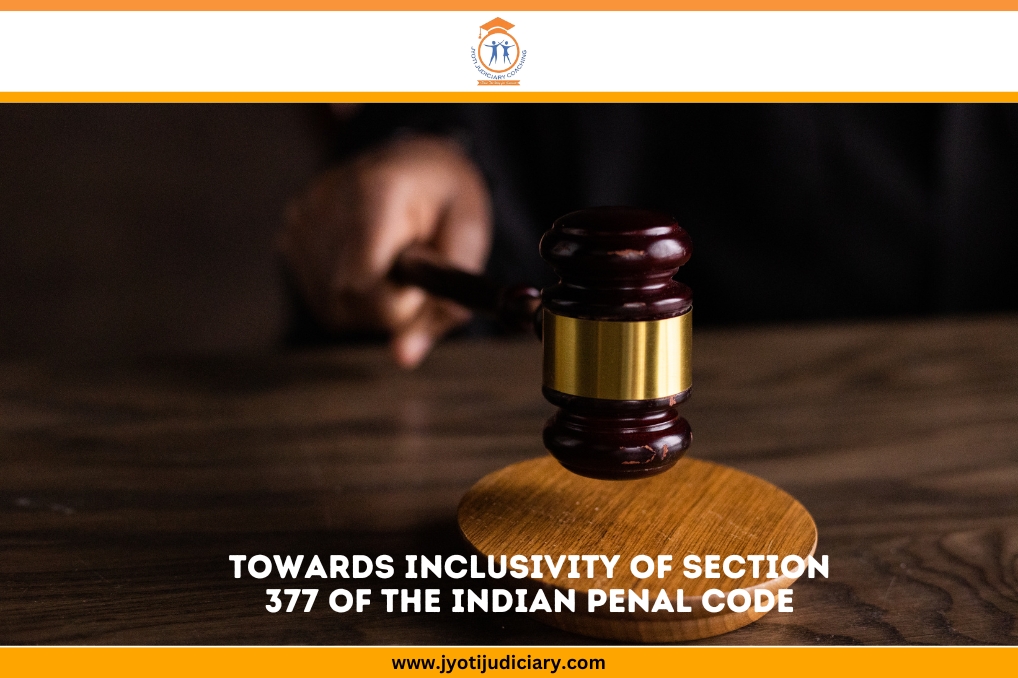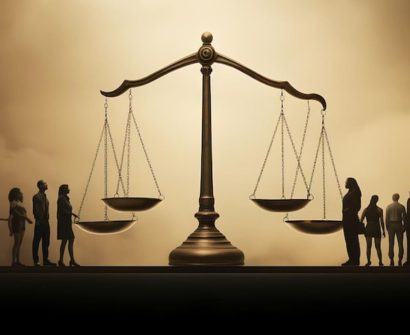
The human rights idea is based on the fundamental premise that all people are created equal. Penalizing somebody for their sexual orientation is an outrageous injustice in an era where worldwide movements for equality are occurring everywhere. India was one of the countries that, up until 2018, criminalized homosexuality and mistreated and tortured LGBT (Lesbian, Gay, Bisexual, and Transgender) people.
On September 7, 2018, the constitutional bench, which includes eminent judges including CJI D.Y. Chandrachud, Justice Dipak Mishra, and Justice Indu Malhotra, issued a landmark decision decriminalizing all forms of consenting sexual activity under section 377 ipc between husband and wife, including homosexual partnerships.
Section 377 of the Indian Penal Code
Anybody who knowingly violates the natural order by having sex with a man, woman, or animal suffers penalties, as stated in section 377 of the Indian penal code.
- This was a colonial-era law that ran counter to modern notions of justice and equality for all. Section 377 ipc also outlawed adult-to-adult private, consensual homosexual relations.
- Even some heterosexual behaviors that are considered to be “against the order of nature” are illegal under section 377 ipc.
- The Supreme Court ruled in 2018 that the use of this Section against consenting adult homosexuals was arbitrary, arbitrary, and unwarranted.
- After the ruling, sec 377 ipc only applies to non-consensual sexual activities, sex with minors, and bestiality. These transgressions are still prohibited.
Section 377 Removed: For and Against
Arguments in Favour:
- Section 377 of the IPC made it illegal for a certain group of people to identify as sexual minorities. The petitioners argued that independence, autonomy, and the right to sexual orientation were essential components of human dignity and that criminalizing homosexuality promotes discrimination and makes it difficult or impossible for LGBTQ people to access essential medical care.
- It also makes HIV prevention, testing, as well as treatment programs harder to come by and less accessible.
- A lot of people argued that since the law treated everyone equally, it did not have to restrict anything that most religions and customary morality forbade.
Arguments Against:
- Several religious organizations as well as denominations opposed it, arguing that homosexuality offended both religious morals and God.
- Some groups protested the removal of this clause. Removing the Section would promote the spread of illnesses like AIDS and put the country’s health in danger, according to another argument opposing it.
Section 377 ipc: The Verdict
- The case of Naz Foundation v. Government of Delhi & Ors brought a challenge to the constitutionality of Section 377 of the IPC before the Delhi High Court.
- In this case, it was argued that Section 377 of the IPC infringes upon the fundamental rights protected by Articles 14, 15, 19, and 21 of the Constitution by concealing the private, voluntary sexual behavior between two adults. This petition was eventually denied because it was not tenable.
- LGBTQ activists submitted five petitions to the Supreme Court in 2016, arguing that their rights to privacy, life, and sexual autonomy under Part III of the Constitution were violated by Section 377 of the IPC.
- The Delhi High Court re-examined same-sex relationships in 2013 after decriminalizing them in 2009. However, the top court’s five-judge panel made it clear on July 10, 2018, that it would only consider new petitions and would not entertain curative pleas.
Way Forward
- Despite the fact that the verdict greatly reduces the stigma attached to the LGBT community, bigotry and prejudice are still widespread in society and require a complex solution.
- It is imperative that anti-discrimination legislation support the LGBT community’s capacity to live happy, fulfilled lives and form satisfying relationships, regardless of their gender identity or sexual orientation.
- It’s also essential to have a written anti-discrimination law that sanctions discriminatory treatment of LGBTQ+ individuals. They will receive protection under the provisions of Article 15 and won’t have to struggle for equal opportunities at work if they take this action.
For the LGBTQ community in India, the abolition of Section 377 of the IPC and the subsequent legalization of homosexuality are significant triumphs. It also improves the lot of sexual minorities and brings India one step closer to achieving social class equality. The transgender movement is assisting us in realizing that gender equality is a prerequisite for full equality in India. In the event that someone’s rights are infringed, they can take legal action by using an online lawyer.
Section 377 of the Indian Penal Code FAQs
1. What is the misuse of Section 377?
A woman who consented to anal intercourse with her spouse throughout their marriage may abuse section 377, but when they had a falling out, was attempting to falsely accuse him.
2. Why was Section 377 removed?
Veerappa Moily, India’s new law minister, concurred that Section 377 might be out of date. In the end, the 150-year-old clause was invalidated by the Delhi High Court in a landmark decision on July 2, 2009, legalizing consensual gay activity between adults.
3. What are the consequences of Section 377?
Consensual adult private sexual activity is prohibited by Section 377 of the IPC. This includes a wide variety of sexual behaviors, even with consent, that occur between people of any gender that differ from heterosexual penile-vaginal sex.
4. Which judge decriminalized Section 377?
The five judges who authored the historic ruling were Justices Indu Malhotra, R.F. Nariman, D.Y. Chandrachud, A.M. Khanwilkar, and then-Chief Justice of India Dipak Misra.
5. Is Section 377 decriminalized?
On September 6, the Indian Penal Code’s Section 377 was largely overturned by a five-judge bench, decriminalizing same-sex relationships between consenting adults. It is now lawful for LGBT people to have consensual relationships.
6. In which year was Section 377 removed?
The Indian Supreme Court invalidated this law in 2018. Remarkably, when Section 377 was eliminated from the IPC, there was no clause dealing with non-consensual sex between “men, women, transperson, and acts of bestiality”.
7. Can 377 IPC be quashed?
Judges have ruled that if a couple has reached a settlement and wants to move on with their lives, the FIR under Section 377 would be dismissed.
8. What is the validity of 377 IPC?
In a majority decision, the Indian Supreme Court ruled that Section 377 of the Indian Penal Code, 1860, which made it illegal to engage in “carnal intercourse against the nature,” which prohibited adults having sexual intercourse with one another after permission, was unconstitutional.
9. How do I fight a false 377 case?
You first agree to a settlement sum, and after that, you engage a reputable criminal defense attorney and provide the paperwork to the court as proof that she falsely filed a case against you in order to obtain money. Under Section 482 of the CrPC, you can also attempt to have all criminal cases dismissed before the High Court.
10. Is LGBT marriage legal in India?
There is no legal prohibition against gay sex or gay expression. Equal cohabitation rights apply to same-sex couples, also referred to as “live-in” relationships. However, as of right now, India does not recognize civil unions, common law marriages, same-sex weddings, guardianship, or partnership certificates.
11. What is 377 for a husband?
Section 375 IPC (Rape) covers all potential penile penetration and exempts marital relations, a spouse cannot be charged under Section 377 IPC (Unnatural Offence).
12. When was Section 377 decriminalized in India?
A while back, homosexuality was seen as a criminal offense. Subsequently, in 2018, a landmark ruling decriminalized Section 377 of the Indian Penal Code, thereby legalizing private gay encounters.
Read the blog to learn about: Capital Punishment in India
With the goal of giving students the best coaching available for law entrance exams including the CLAT, AILET, and various other numerous state judiciary exams, Jyoti Judiciary Coaching, India’s Finest educational Platform, was established. Come enroll now with Jyoti Judiciary!
For any latest news, legal topics, judiciary exams notifications, patterns, etc watch Jyoti Judiciary’s YouTube channel for legal videos for any updates at https://youtube.com/@jyotijudiciarycoaching4852?si=2cwubh9d2A9urwJf










